Immortals In Hindu Mythology
About - Immortals
Immortals are beings or entities that are said to live forever or possess eternal life in various mythologies and traditions. These immortal entities often appear in religious texts and legends across cultures and civilizations.
In Hindu mythology, immortality depicts various divine beings and sages that transcend the boundaries of death. The concept of immortality often serves as a theme exploring the implications of living forever, including the loss of loved ones, the burden of endless existence, and the search for meaning in an eternal life.
There are seven such immortals in Hindu mythology. These seven figures represent a diverse array of immortal beings in Hindu mythology, each embodying distinct qualities, virtues, and roles within the cosmic drama of existence. While their stories vary in detail and interpretation, they collectively illuminate Hindu mythology’s profound wisdom and spiritual insights.
Vibhishana
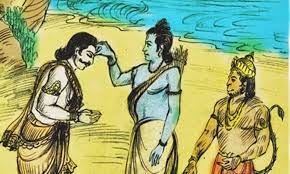
Vibhishana is an important character in Hindu mythology, in the epic Ramayana. He is the younger brother of the demon king Ravana. Vibhishana’s story encompasses loyalty, righteousness, and ultimately, a pursuit of spiritual truth that leads to his association with immortality.
In the Ramayana, Vibhishana is depicted as a noble and virtuous character who finds himself at odds with the tyrannical rule of his brother, Ravana, the king of Lanka. Despite being a demon by birth, Vibhishana’s moral compass and unwavering devotion to righteousness set him apart from the cruel actions of his kin.
Recognizing the injustices perpetrated by Ravana, Vibhishana chooses to align himself with Lord Rama, the embodiment of virtue and dharma (righteousness), during the epic’s central conflict.
Vibhishana’s decision to join Lord Rama’s cause displays his commitment to truth and justice over familial ties and worldly power. His counsel proves invaluable to Rama throughout the battle against Ravana, ultimately contributing to the defeat of the demon king and the restoration of righteousness.
Following Ravana’s downfall, Vibhishana is appointed as the ruler of Lanka by Lord Rama, a testament to his integrity and loyalty. However, it is in the aftermath of these events that Vibhishana’s association with immortality.
According to some versions and interpretations of the Ramayana, Vibhishana is believed to have attained a form of spiritual immortality or liberation known as moksha. Moksha represents the ultimate goal in Hindu philosophy, signifying the liberation of the soul from the cycle of birth and death (samsara) and the attainment of union with the divine.
Vibhishana’s unwavering devotion to dharma and his service to Lord Rama is considered instrumental in his spiritual journey. His righteousness and selflessness elevate him beyond the realm of mortal concerns, aligning him with the divine and paving the way for his spiritual transformation.
Kripacharya
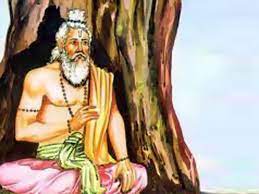
Kripacharya occupies a revered position as a sage, warrior, and teacher whose life and deeds are intricately woven into the fabric of the epic tale Mahabharata. The immortality of Kripacharya, however, transcends mere longevity of existence; it encompasses the enduring legacy of his wisdom, righteousness, and unwavering commitment to dharma (righteousness) in the face of moral ambiguity and conflict.
Kripacharya was born to the sage Shardwan and Janapadi, Kripacharya is revered for his martial prowess, unparalleled archery skills, and profound knowledge of scriptures and warfare. Central to Kripacharya’s immortality is his unwavering adherence to dharma, which serves as the guiding principle of his life.
As the royal preceptor (Guru) to both the Pandavas and the Kauravas, Kripacharya shoulders the weighty responsibility of imparting moral and martial education to the princes, instilling in them the virtues of righteousness, humility, and valour.
Throughout the Mahabharata, Kripacharya emerges as a voice of reason and conscience amid the escalating tensions and political machinations that ultimately led to the Kurukshetra War. Despite his allegiance to the Kauravas, Kripacharya remains a beacon of impartiality and integrity, refusing to succumb to the allure of power or personal biases.
Kripacharya’s pivotal role in the Kurukshetra War embodies the complexities of moral choice and ethical dilemmas that define the human condition. Despite his deep sense of duty to his benefactors, Kripacharya is not immune to the moral ambiguities and existential struggles that permeate the epic narrative.
The immortality of Kripacharya extends beyond the temporal realm, transcending the boundaries of mortal existence to encompass the enduring legacy of his teachings and principles. As a revered sage and mentor, Kripacharya imparts timeless wisdom and moral guidance that resonate across generations, inspiring seekers of truth and righteousness to navigate the complexities of life with integrity and fortitude.
Kripacharya occupies a significant place as a paragon of virtue and wisdom, whose indomitable spirit and unwavering commitment to dharma serve as a guiding light for humanity’s collective journey toward enlightenment and self-realization.
Bali
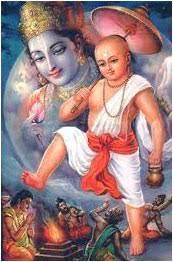
Bali occupies an important place as a legendary king and noble character whose story illustrates themes of devotion, sacrifice, and spiritual transcendence. Bali’s immortality, however, extends beyond the realm of physical existence; it encompasses his enduring legacy as a symbol of righteousness and selflessness.
Bali is prominently featured in Hindu texts, most notably in the epic Ramayana and various Puranas. He is portrayed as a virtuous and powerful king of the Asuras, a group of divine beings often associated with demons or anti-gods in Hindu mythology. Despite his Asura lineage, Bali is depicted as a benevolent ruler who governs with justice and compassion, earning the admiration and respect of his subjects.
One of the most renowned episodes involving Bali is his encounter with Lord Vishnu, the preserver of the universe, in the form of Vamana, a dwarf Brahmin. According to the legend, Vamana approaches Bali during a sacrificial ceremony and requests alms in the form of land that he can cover in three strides. Bali, known for his generosity, readily agrees to the humble request.
However, as Vamana assumes his cosmic form, he expands to colossal proportions, covering the entire universe in two strides. With no space left to fulfill his promise, Bali humbly offers his head as the resting place for Vamana’s final stride. Impressed by Bali’s unwavering devotion and sacrificial spirit, Lord Vishnu grants him immortality and eternal glory.
Bali’s immortality, therefore, transcends the limitations of physical life; it symbolizes his spiritual enlightenment and selfless surrender to divine will. As a devotee of Lord Vishnu, Bali exemplifies the path of Bhakti, or devotion, which emphasizes total surrender and self-effacement before the divine.
Beyond the realm of mythology, Bali’s legacy endures as a timeless symbol of integrity, generosity, and humility. His unwavering commitment to righteousness and his willingness to sacrifice personal glory for the greater good serve as inspiring examples for humanity.
Moreover, Bali’s story reminds us of the transient nature of worldly power and the impermanence of material possessions. True immortality, as exemplified by Bali, lies not in the pursuit of temporal riches or earthly dominion, but in the pursuit of spiritual truths and selfless service to others.
Hanuman
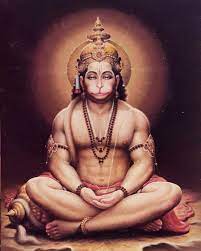
Hanuman is revered as the epitome of devotion, courage, and loyalty. His immortality is not merely a matter of physical endurance but embodies the eternal resonance of his unwavering commitment to righteousness, selflessness, and divine service.
Hanuman’s origins trace back to the great Hindu epic, the Ramayana, where he emerges as a leading character, embodying the ideals of devotion and selfless service. Born to Anjana and Kesari, he is bestowed with divine attributes and blessed with unparalleled strength and agility, making him a formidable force in the world of gods and mortals alike.
One of the most iconic episodes in Hanuman’s life revolves around his unwavering devotion to Lord Rama, the seventh avatar of Lord Vishnu, and his role in the search for Rama’s consort, Sita, who was abducted by the demon king Ravana.
Hanuman’s journey to Lanka, his fearless encounters with adversaries, and his heroic exploits in service of Rama exemplify his unyielding commitment to righteousness and his undying loyalty to his beloved master.
Central to Hanuman’s immortality is his embodiment of Bhakti, the path of devotion, which emphasizes a deep and intimate connection with the divine. Hanuman’s devotion to Lord Rama transcends the boundaries of mortal love and attachment, embodying a selfless surrender to the will of the divine and an unwavering faith in the cosmic order.
Hanuman’s immortality also finds expression in his role as a messenger, diplomat, and counselor during the epic war between Rama and Ravana. His diplomatic missions, strategic insights, and invaluable counsel contribute significantly to the eventual triumph of righteousness over evil, underscoring his pivotal role in the cosmic drama of creation and destruction.
Hanuman’s immortality extends beyond the confines of the Ramayana, permeating the cultural and spiritual landscape of India and beyond. He is venerated as a symbol of strength, wisdom, and protection, revered by millions of devotees as a guardian deity and a source of inspiration in times of adversity.
Hanuman’s immortality resides not in the temporal realm of flesh and blood but in the enduring legacy of his teachings, virtues, and exploits. His story continues to inspire generations of seekers and devotees, reminding them of the transformative power of devotion, the boundless potential of the human spirit, and the eternal presence of the divine in every aspect of creation.
Parashuram
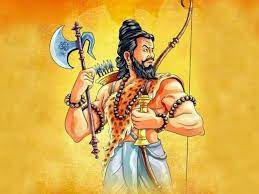
Parashuram is the sixth avatar of Lord Vishnu, embodying the timeless principles of righteousness, valour, and divine intervention. His immortality transcends the constraints of mortal existence, symbolizing the eternal resonance of his divine mission and the enduring legacy of his teachings and exploits.
The legend of Parashurama is deeply intertwined with the epic narratives of the Puranas and the Mahabharata, where he emerges as a formidable warrior sage and a fierce protector of dharma (righteousness). Born as the son of the sage Jamadagni and Renuka,
Parashurama is bestowed with divine attributes and unparalleled martial prowess, wielding his iconic axe, the Parashu, as a symbol of his righteous fury and unwavering commitment to justice.
One of the most renowned episodes in Parashurama’s life revolves around his relentless pursuit of the eradication of evil and the restoration of order in the world. According to Hindu mythology, he is instrumental in cleansing the earth of the corrupt and tyrannical Kshatriya rulers, who had deviated from the path of righteousness and virtue.
Central to Parashurama’s immortality is his unwavering allegiance to his divine mission and his unyielding commitment to the principles of truth, integrity, and righteousness. Despite facing numerous trials and tribulations along his path, including the loss of his father and the betrayal of his kin, Parashurama remains steadfast in his resolve to fulfill his sacred duty and uphold the cosmic balance.
Moreover, Parashurama’s immortality finds expression in his role as a mentor and guru to successive generations of warriors and seekers, imparting timeless wisdom and martial knowledge that transcend the boundaries of time and space. His hermitage becomes a sacred repository of esoteric teachings and spiritual practices, attracting disciples and devotees from far and wide who seek enlightenment and liberation from the cycle of birth and death.
In the hearts and minds of believers, Parashurama remains a living embodiment of the eternal principles of dharma, karma, and moksha, inspiring generations of seekers and aspirants to walk the path of righteousness and self-realization. His story serves as a timeless reminder of the transformative power of devotion, discipline, and divine grace in overcoming the challenges of mortal existence and attaining union with the supreme.
Ashwathama
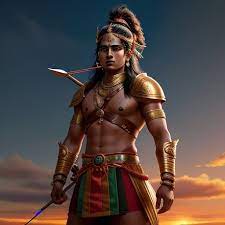
Ashwatthama is a complex and enigmatic figure whose immortality is shrouded in mystery and intrigue. As a character from the epic Mahabharata, Ashwatthama’s story embodies themes of loyalty, vengeance, and the consequences of hubris, culminating in his association with a form of immortality that is both cursed and revered.
The son of Dronacharya, the legendary warrior and master of military arts, Ashwatthama inherits his father’s martial prowess and unyielding dedication to duty. Throughout the Mahabharata, Ashwatthama is portrayed as a formidable warrior who fights alongside the Kauravas, the cousins of the Pandavas, in the great war of Kurukshetra.
One of the most tragic episodes in Ashwatthama’s life occurs during the final days of the Kurukshetra War when he is consumed by grief and rage upon learning of the death of his father, Dronacharya. Blinded by his desire for revenge, Ashwatthama commits a heinous act by unleashing the Narayanastra, a powerful celestial weapon, against the Pandava forces, resulting in catastrophic consequences.
However, Ashwatthama’s immortality takes a dark and cursed turn following his reckless actions during the war. In a fit of rage and despair, he targets the unborn child of Abhimanyu, the valiant son of Arjuna, to wipe out the Pandava lineage. This act of treachery and cruelty earns him the ire of Lord Krishna, the divine incarnation of Vishnu, who curses Ashwatthama with immortality and eternal suffering.
According to Hindu mythology, Ashwatthama is condemned to wander the earth for eternity, bearing the burden of his sins and the weight of his curse. His immortality becomes a curse rather than a blessing, as he is condemned to endure the pain and anguish of his actions for all time.
Despite his cursed existence, Ashwatthama’s story serves as a cautionary tale about the consequences of unchecked rage and the folly of succumbing to the darker impulses of human nature. His tragic fate reminds us of the importance of humility, compassion, and self-restraint in the face of adversity and injustice.
Ashwatthama’s immortality is a testament to the complexities of the human condition and the eternal struggle between light and darkness, virtue and vice. His story serves as a poignant reminder that every action, no matter how seemingly insignificant, carries consequences that ripple through time and space, shaping the course of our destinies and the fabric of the universe.
Ved Vyas
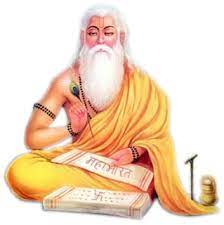
Ved Vyas play a pivotal role in compiling and disseminating the sacred texts of ancient India, including the Vedas, Mahabharata, Puranas, and other philosophical treatises. His immortality transcends the confines of physical existence, manifesting through his enduring contributions to knowledge, wisdom, and spiritual enlightenment.
Ved Vyasa, also known as Krishna Dvaipayana Vyasa, is believed to be a manifestation of Lord Vishnu himself, born to the sage Parashara and Satyavati. His life and deeds are intricately woven into the fabric of Hindu mythology and literature, embodying the timeless principles of dharma (righteousness), karma (action), and moksha (liberation).
As the compiler of the Mahabharata, Ved Vyasa serves as the narrator and guiding voice of this monumental text, imparting profound insights into the nature of existence, human frailty, and the cosmic order.
Ved Vyasa is also credited with authoring the eighteen Puranas, which serve as repositories of mythological lore, religious rituals, and moral teachings. His encyclopedic knowledge and spiritual wisdom are reflected in the vast expanse of these sacred texts, which continue to inspire and enlighten seekers of truth and wisdom across generations.
The immortality of Ved Vyasa resides not only in his literary and philosophical contributions but also in his embodiment of the timeless principles of Hindu spirituality. As a sage and seer, he represents the eternal quest for knowledge, self-realization, and communion with the divine.
Furthermore, Ved Vyasa’s immortality finds expression in his role as a spiritual guru and preceptor to successive generations of seekers and aspirants. Through his teachings and discourses, he imparts the profound truths of Vedanta, yoga, and Vedantic philosophy, guiding disciples on the path to self-discovery and liberation from the cycle of birth and death.
In the hearts and minds of believers, Ved Vyasa remains a living embodiment of the eternal truths of Hinduism, symbolizing the infinite potential of the human spirit and the boundless expanse of divine grace. His life and legacy serve as a beacon of hope and inspiration in a world fraught with uncertainty and turmoil, guiding humanity toward the light of wisdom, compassion, and spiritual enlightenment.
The immortality of Ved Vyasa transcends the limitations of time and space, resonating with seekers and devotees across cultures, generations, and spiritual traditions. His life and teachings continue to illuminate the path of righteousness and self-realization, inspiring humanity to strive for higher ideals and deeper truths in the pursuit of eternal bliss and fulfillment.




 (1 votes, average: 5.00 out of 5)
(1 votes, average: 5.00 out of 5)


